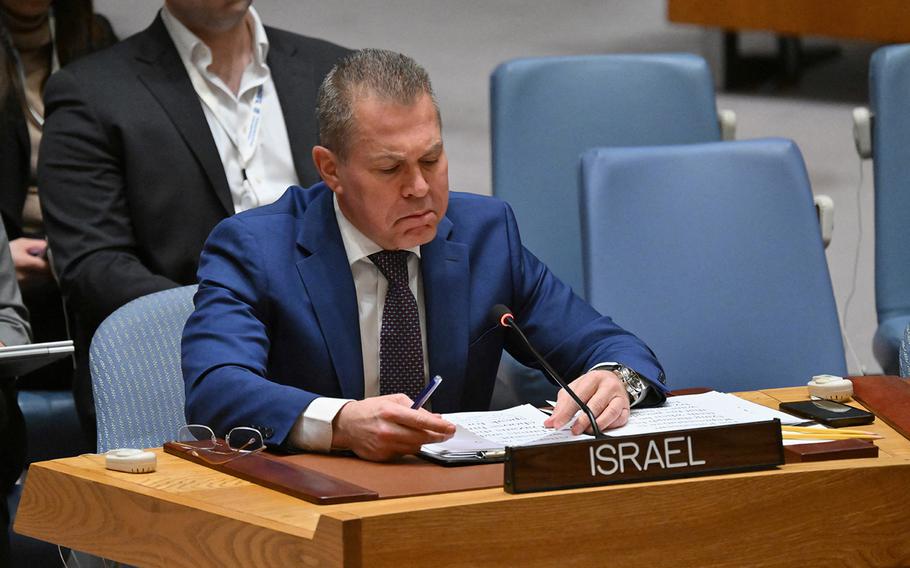
Israel’s Ambassador to the UN Gilad Erdan speaks during a United Nations Security Council meeting on the situation in the Middle East, including the Palestinian question, at UN headquarters in New York on March 25, 2024. (Angela Weiss/AFP via Getty Images/TNS)
(Tribune News Service) — Israel’s ambassador to the United Nations often fights with the organization where he serves, especially as criticism has mounted over his country’s conduct in the war against Hamas. He’s just not used to doing it without the U.S. in his corner.
That’s where Gilad Erdan found himself recently when the U.S. chose not to veto a Security Council resolution calling for an immediate cease-fire in Gaza. President Joe Biden’s administration had blocked several such resolutions since the conflict began.
“To this council, Israeli blood is cheap,” Erdan told the council after the council’s vote. “This is a travesty, and I’m disgusted.”
They were relatively mild remarks for Erdan, 53, who has made it a strategy to tear down the U.N. as the Gaza war has dragged on. He called on Secretary-General Antonio Guterres to resign after the U.N. chief said the Hamas attack “did not happen in a vacuum,” and this week Erdan said Adolf Hitler “would be singing the U.N.’s praises.”
His approach to the global body has become an increasingly risky and dissonant one as the Palestinian death toll continues to rise. Even the U.S. has seen its close ties with Israel fray, with Biden calling out Israel more often over the need for more humanitarian aid, the Israeli attack that killed seven aid workers from World Central Kitchen and Prime Minister Benjamin Netanyahu’s plans for a military operation in Rafah, where more than 1 million civilians are sheltering.
“Erdan’s two main tasks are to score public points against Israel’s detractors and to delegitimize criticism from all parts of the U.N. system,” said Richard Gowan, U.N. director for the International Crisis Group. “Israel’s strategy of dismissing the U.N. completely does alienate a lot of otherwise broadly sympathetic countries, notably the Europeans.”
The ambassador’s tactics encapsulate an element of Israel’s strategy in the months since fighters from Hamas — designated a terrorist organization by the U.S. and European Union — attacked Israel from the south on Oct. 7, killing 1,200 people and taking some 240 hostages. Israel’s counter-attack has killed more than 30,000 Palestinians, according to the Hamas-run health ministry in Gaza.
U.N. members have yet to act jointly to condemn the Hamas attack. But rather than seeking sympathy, Erdan has deployed an uncompromising approach toward fellow diplomats and the world body.
Two U.N. diplomats from countries with close ties to Israel, who asked not to be identified discussing Erdan, said that it’s becoming increasingly hard for their ambassadors to appear alongside him. Two others suggested his attacks on the U.N. system alienate moderate U.N. members.
Erdan, who briefly served as ambassador in Washington, is blunt about the U.S. While praising close ties with Washington as “one of the biggest assets that Israel has,” he said in an interview that “it’s not being understood enough” that the relationship is “mutually beneficial.” He said Israeli military technologies and intelligence-gathering in the Middle East help protect U.S. troops.
Israel has long accused the U.N. of bias in favor of the Palestinian cause. Erdan describes the world body as a politicized institution where Israel is outnumbered and out-voted by non-democracies and a large bloc of Muslim countries. In the past decade, the General Assembly has adopted about 230 critical resolutions concerning Israel, more than five times the number of texts on Russia, Iran or Myanmar, according to a tally compiled by Bloomberg News.
In addition to the failure of U.N. members to formally condemn the attack by Hamas, Israel has alleged that employees of the U.N.’s main relief agency in the Palestinian territories actually participated in the attack, prompting a review.
Yellow star
Yet Israel’s conduct of the war has left Erdan increasingly open to criticism. U.N. agencies have called for an end to the fighting and warned of “man-made” famine in Gaza, while a U.N.-appointed expert has accused Israel of genocide.
Erdan — a veteran politician who served as Israel’s minister of public security and previously led an effort to counter activists targeting Israel with a boycott, divestment and sanctions campaign — has fought back. Early in the Gaza conflict, he pinned a yellow star to the lapel of his suit, like those the Nazis once forced Jews to wear.
“I am left with no other choice,” he said, than “to find creative ways — some might call them shocking ways, I don’t care — but to draw the attention of the civilized world to what the Israeli people are enduring.”
The move was condemned by the head of the Yad Vashem Holocaust remembrance center in Jerusalem, who said it “dishonors both the victims of the Holocaust and the State of Israel.” In November, Chinese Ambassador Zhang Jun, while presiding over the Security Council, interrupted Erdan’s fiery speech on the war to remind him to please “show some basic respect.”
Israel “squandered the sympathy and solidarity after October 7th by carrying out a horrific, unprecedented war of destruction on Gaza,” said Khaled Elgindy, a senior fellow at the Middle East Institute in Washington who previously advised Palestinian leaders. “And they cannot understand how the world does not see the reality exactly as they see it.”
©2024 Bloomberg L.P.
Visit bloomberg.com
Distributed by Tribune Content Agency, LLC.